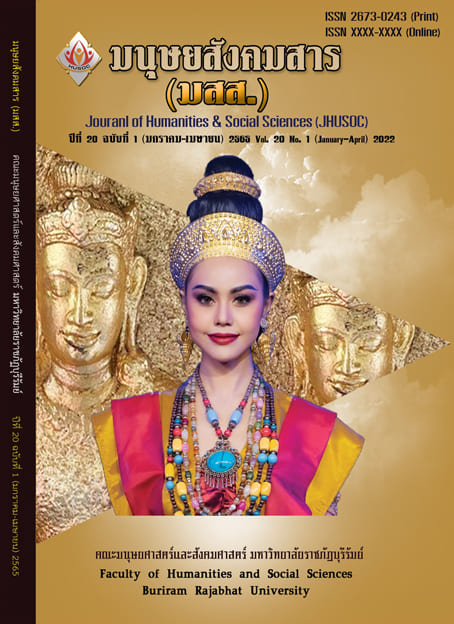From Enemy to Friend: Participatory Action Research to develop A farmers' debt management Approach
Main Article Content
Abstract
The research aims to 1) test the management of farmer debt problems using three approaches: reducing expenditures, increasing income, and debt consolidation; and 2) study the factors affecting the success of farmers’ debt management in accordance with the three approaches. This research is a second phase and used participatory action research and employed the use of interviews, in-depth interviews, and group discussions among five community member volunteers. One person chose expenditure reduction, one chose additional income, and three chose debt consolidation. The results showed that choosing a debt management approach requires consideration of the capacity and vulnerability of households. The expenditure reduction approach showed that the household expenditures could only be reduced by a small portion since most of the expenditures were for production investments. Farmers who chose the approach to increase income needed to have high education, be young and active, and have IT skills. The debt consolidation approach did not reduce the amount of debt but reduced the number of sources of debt repayment and debt flow. This research found that farmers do not view debt negatively because they can use loans allocated by the state and financial institutions to ease the financial burden. Therefore, farmers can turn debt from an enemy to a friend and maintain the farmer's small agricultural economy for a long time.
Article Details

This work is licensed under a Creative Commons Attribution-NonCommercial 4.0 International License.
เนื้อหาและข้อมูลในบทความที่ลงตีพิมพ์ในวารสารทดสอบระบบ ThaiJo2 ถือเป็นข้อคิดเห็นและความรับผิดชอบของผู้เขียนบทความโดยตรงซึ่งกองบรรณาธิการวารสาร ไม่จำเป็นต้องเห็นด้วย หรือร่วมรับผิดชอบใดๆ
บทความ ข้อมูล เนื้อหา รูปภาพ ฯลฯ ที่ได้รับการตีพิมพ์ในวารสารทดสอบระบบ ThaiJo2 ถือเป็นลิขสิทธิ์ของวารสารทดสอบระบบ ThaiJo2 หากบุคคลหรือหน่วยงานใดต้องการนำทั้งหมดหรือส่วนหนึ่งส่วนใดไปเผยแพร่ต่อหรือเพื่อกระทำการใดๆ จะต้องได้รับอนุญาตเป็นลายลักอักษรจากวารสารทดสอบระบบ ThaiJo2 ก่อนเท่านั้น
References
Boonyang, K. (2020). Death knot: The state and farmer's suicide. Bangkok: Thammasat University. [in Thai]
Chawanot, C. (2021). Appropriate loans and financial services to solve farmer debt. In Pongthip S. (ed.), Deciphering the farmer's debt case. Bangkok: Local Act. [in Thai]
Kusantia, A., & Phophonprom, P. (2018). Peasant crisis, agricultural structural crisis. In Pongthip S. (Ed.), Farmers and changes. Bangkok: Local Act. [in Thai]
Natsupha, C. (2003). Statement of the Thai village community economic research project series. Bangkok: The Thailand Research Fund. [in Thai]
National Statistical Office. (2019). Agricultural famer household debt 2019. http://www.nso.go.th [in Thai]
Ouiyanon, P. (2003). Central village community economy. Bangkok: Wtteethut Institute. [in Thai]
Puapongsakorn, N., Hengtrakul, J., Anuchitworawongwan, C., Intharitak, C., Arayapong, A., Chantasiripong,U., Suwanditthakun, P., Puntakua, K., Sri- anan,N., Nanta, M., & Gremi, M. (2015). The study of farmer debt and improvement guidelines fund operations in the supervision of the Ministry of Agriculture and Cooperatives. Bangkok: Thailand Development Research Institute. [in Thai]
Samranchit, P. (2013). Cheevit Prim Nan. Bangkok: Local Act. [in Thai]
Samranchit, P.. (2018). Adaptation of Thai farmers. Bangkok: Local Act. [in Thai]
Samranchit, P.. (2020). Deciphering the farmer's debt case. Bangkok: Local Act. [in Thai]
Santasombat, Y. (2003). Dynamics and resilience of peasant society: Northern community economy and adjusting the paradigm on communities in third world countries. Chiang Mai: Chiang Mai University. [in Thai]
Sukkomneid, D. (2012). Policies and mechanisms for resolving farmer debt. In Pongthip S. (Ed.), Farmers and changes. Bangkok: Local Act. [in Thai]
Thacheen, T., Chaisuparakul, S., Tongchure, S., & Chaimangkhala, T. (2020). The sustainable approaches to reduce debt by community participation process of baan na chai chai nat province. Bangkok: Chandrakasem Rajabhat University. [in Thai]
Thacheen, T., Chaisuparakul, S., & Tongchure, S. (2021). The sustainable approaches to reduce debt by community Participation process of baan don saak chai nat province (phase 2) Bangkok: Chandrakasem Rajabhat University. [in Thai]
The Office of Farmer’s Reconstruction and Development Fund. (2019). Farmer’s reconstruction and development fund act. http://www.parliament.go.th [in Thai]
Yaimuang, S., Hwangsaajachokh, W., Mitprasart, M., & Yangyuen, K. (2018). Farmers and changes. Bangkok: Thailand Development Research Institute. [in Thai]


